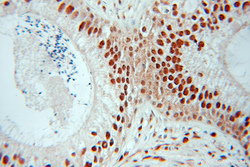Antibody data
- Antibody Data
- Antigen structure
- References [6]
- Comments [0]
- Validations
- Western blot [1]
- Immunohistochemistry [1]
Submit
Validation data
Reference
Comment
Report error
- Product number
- 10972-1-AP - Provider product page

- Provider
- Proteintech Group
- Proper citation
- Proteintech Cat#10972-1-AP, RRID:AB_2086628
- Product name
- CTBP1 antibody
- Antibody type
- Polyclonal
- Description
- KD/KO validated CTBP1 antibody (Cat. #10972-1-AP) is a rabbit polyclonal antibody that shows reactivity with human, mouse and has been validated for the following applications: IF, IHC, IP, WB, ELISA.
- Reactivity
- Human, Mouse
- Host
- Rabbit
- Conjugate
- Unconjugated
- Isotype
- IgG
- Vial size
- 20ul, 150ul
Submitted references Toosendanin Restrains Idiopathic Pulmonary Fibrosis by Inhibiting ZEB1/CTBP1 Interaction.
RBBP8/CtIP suppresses P21 expression by interacting with CtBP and BRCA1 in gastric cancer.
Role of miR-214 in regulation of β-catenin and the malignant phenotype of melanoma.
Role of hepatoma-derived growth factor in promoting de novo lipogenesis and tumorigenesis in hepatocellular carcinoma.
ZNF516 suppresses EGFR by targeting the CtBP/LSD1/CoREST complex to chromatin.
CDYL suppresses epileptogenesis in mice through repression of axonal Nav1.6 sodium channel expression.
Li X, Bai Z, Li Z, Wang J, Yan X
Current molecular medicine 2024;24(1):123-133
Current molecular medicine 2024;24(1):123-133
RBBP8/CtIP suppresses P21 expression by interacting with CtBP and BRCA1 in gastric cancer.
Yu Y, Chen L, Zhao G, Li H, Guo Q, Zhu S, Li P, Min L, Zhang S
Oncogene 2020 Feb;39(6):1273-1289
Oncogene 2020 Feb;39(6):1273-1289
Role of miR-214 in regulation of β-catenin and the malignant phenotype of melanoma.
Prabhakar K, Rodrίguez CI, Jayanthy AS, Mikheil DM, Bhasker AI, Perera RJ, Setaluri V
Molecular carcinogenesis 2019 Nov;58(11):1974-1984
Molecular carcinogenesis 2019 Nov;58(11):1974-1984
Role of hepatoma-derived growth factor in promoting de novo lipogenesis and tumorigenesis in hepatocellular carcinoma.
Min X, Wen J, Zhao L, Wang K, Li Q, Huang G, Liu J, Zhao X
Molecular oncology 2018 Sep;12(9):1480-1497
Molecular oncology 2018 Sep;12(9):1480-1497
ZNF516 suppresses EGFR by targeting the CtBP/LSD1/CoREST complex to chromatin.
Li L, Liu X, He L, Yang J, Pei F, Li W, Liu S, Chen Z, Xie G, Xu B, Ting X, Zhang Z, Jin T, Liu X, Zhang W, Yuan S, Yang Z, Wu C, Zhang Y, Yang X, Yi X, Liang J, Shang Y, Sun L
Nature communications 2017 Sep 25;8(1):691
Nature communications 2017 Sep 25;8(1):691
CDYL suppresses epileptogenesis in mice through repression of axonal Nav1.6 sodium channel expression.
Liu Y, Lai S, Ma W, Ke W, Zhang C, Liu S, Zhang Y, Pei F, Li S, Yi M, Shu Y, Shang Y, Liang J, Huang Z
Nature communications 2017 Aug 25;8(1):355
Nature communications 2017 Aug 25;8(1):355
No comments: Submit comment
Supportive validation
- Submitted by
- Proteintech Group (provider)
- Main image

- Experimental details
- Jurkat cells were subjected to SDS PAGE followed by western blot with 10972-1-AP(CTBP1 antibody) at dilution of 1:500
- Sample type
- cell line
Supportive validation
- Submitted by
- Proteintech Group (provider)
- Main image

- Experimental details
- The CTBP1 antibody from Proteintech is a rabbit polyclonal antibody to a recombinant protein of human CTBP1. This antibody recognizes human, mouse antigen. The CTBP1 antibody has been validated for the following applications: ELISA, WB, IHC analysis.
 Explore
Explore Validate
Validate Learn
Learn Western blot
Western blot ELISA
ELISA